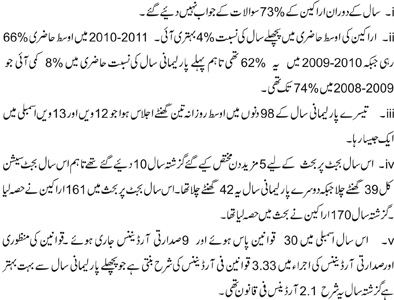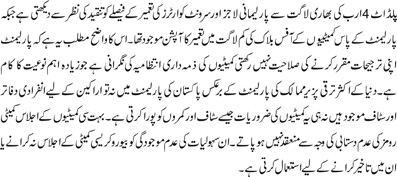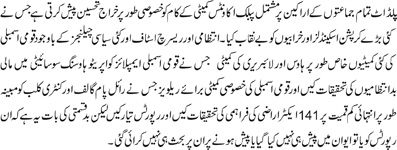|
|
| |
| EVENTS |
|
|
> PILDAT analyses 3rd year of the 13th National Assembly
|
|
|
| |
Islamabad, March 16; Upon the conclusion of the 3rd Parliamentary year, PILDAT analysis reveals that there has been negligible change in the overall performance of the 13th National Assembly of Pakistan in its 3rd year and therefore the need for systemic reforms and improvement is as pressing as was a year ago. A snapshot of performance shows that: |
|
| |
- 73% of the MNAs Questions remained unanswered during the Year
- Average attendance of MNAs improved 4% from the previous year: 66% in 2010-2011 compared to 62% in 2009-2010, although still 8% below the average attendance during 1st year: 74% in 2008-2009
- Met a dismal 3 hours per day at an average during 98 days in 3rd year; a consistent average through the 12th and the 13th Assemblies
- 5 more days added to Budget debate from 10 days in last year though time consumed in Budget session fell to 39 hours from 42 hours in 2nd year; 161 members participated in budget debate compared to 170 last year
- Laws passed to Presidential Ordinances issued ratio stands at 30 to 9 or 3.33 laws passed for every ordinance - significant improvement from the 2nd years of 2.1 ordinances for every law passed by the Assembly
-
|
|
| |
Despite declining interest of members in the House proceedings and the absence of ministers, even pointed out by the Chair, it is a sign of maturity that the parties and members present in the House have upheld Parliamentary practices evident from lack of rowdyism in the 3 years of the National Assembly. However, looking at the trend in Provincial Assembly of the Punjab, it is feared that a tit-for-tat approach may be in the offing in the National Assembly which will be a poor response to the gains made during the past three years, observed PILDAT. |
|
| |
PILDAT believes that the Parliament needs to institutionalise a recruitment and promotion policy of Staff through the Federal Public Service Commission, as applicable to all other entities of the Government, and the promotions of full-time staff should be subject to successful completion of courses at the National School of Public Policy like the Civil Service officials in Pakistan. |
|
| |
PILDAT also criticised the decision to construct extension of the Parliamentary lodges and servant quarters at the huge cost of Rs. 4 billion when the Parliament had the option to construct an Office bloc for Committees which was to cost less. This clearly shows Parliament�s inability to prioritise the work of facilitating Executive�s oversight, the key responsibility of committees, which is unfortunate. Pakistan�s Parliament, unlike a majority of Parliaments even in the developing countries, neither provide offices or staff to individual MNAs nor it caters adequately to Committees needs in terms of research staff and committee rooms. Most of the Committees can not hold meetings due to lack of availability of a couple of Committee rooms in the Parliament building. This lack of facilities also serves as a tool for controlling the Parliament as bureaucracy often uses it as a tactic to delay or stop a committee meeting from taking place. |
|
| |
Despite such professionally trying circumstances where MNAs do not even have access to an office, computer, or research or legislative staff, and innumerable responsibilities relating to constituencies and delivery of services to public, it is admirable that MNAs have still managed to introduce over 200 Private Members Bills and nearly 30,000 questions in 3 years including over 70 reports of the Committees. If the Government and the Parliament truly believe in strengthening the legislative branch of the State, it is high time that prioritised investments are made through providing offices and research support to legislators and committees instead of just focusing on adding to their residential facilities, observed PILDAT. |
|
| |
PILDAT especially praised the work of the all-party Public Accounts Committee in investigating some key embezzlement and corruption scandals and observed that despite administrative, staff, research and sometimes political challenges many committees, especially National Assembly�s Committee on House and Library that investigated the alleged financial misappropriations in the purchase of land for the National Assembly Employees Cooperative Housing Society (NAECHS), and the National Assembly Special Committee on Railways that investigated the 45%1 contract allotting 141 acres of Railways land to the Royal Palm Golf and Country Club allegedly on nominal prices, have managed to carry out objective and authentic investigations and prepared reports many of which have either not been presented in the House or those have not been discussed in the House which is a sorry state of affairs. |
|
| |
|
|
| |
|
|
| |
|
|
| |

|
|
| |
|
|
| |

|
|
| |
|
|
| |

|
|
| |
|
|
| |

|
|
| |
|
|
| |

|
|
| |
|
|
| |

|
|
| |
|
|
| |

|
|
| |
|
|
| |

|
|
|
|
|
|
|
|
|